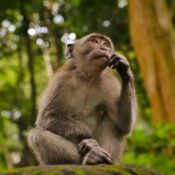Author: Jean Corriveau
Probabilistic Calculations Are Flawed – Amino Acids
In last April’s blog Probabilistic Calculations Are Flawed – Words and Letters, I reviewed scientist David Foster’s calculations in which he used Wordsworth’s Daffodils to argue for life as a creation from God. He also made a parallel with the hemoglobin protein, a molecule comprised of a chain of 516 amino acids. Each of these chains contains heme, a compound that contains iron. One of the functi...
Abiogenesis
An acquaintance told me that he doesn’t believe in the theory of evolution because it’s like believing that life came from nothing. I replied that, on the contrary, at the moment of the emergence of life, the earth consisted of a complex environment; no chemical structure was independent of its surroundings. Creationism is believing in complexity coming out of nothing (creatio ex nihilo) since it’...
Probabilistic Calculations Are Flawed – Words and Letters (Part 2)
In my blog of last October “Humans Impose Themselves on Nature”, I stated that people view nature from their perspective, thereby giving nature properties and qualities it doesn’t have: When religions first appeared, the thinkers of the time had no knowledge of (1) how life worked on a microbiological level, (2) how the brain worked, (3) how the laws of nature worked. So, they attributed dreams, a...
Probabilistic Calculations Are Flawed – Words and Letters
In his book The Philosophical Scientists, scientist David Foster performs calculations in an attempt to show that life could not have evolved by chance. He chose Wordsworth’s Daffodils, specifically the verse that starts as ‘I wandered lonely as a cloud That floats on high…’ It contains 159 letters. He imagined monkeys, each at a keyboard, hammering away and getting the 159 letters in the exact se...
Entropy and Inter-connectivity in Evolution
In a gas, if atoms aren’t bound to each other, motion is random, and we have maximum entropy. For instance, the atoms in a tank of hydrogen. The second law of thermodynamics states that a system always goes toward disorder, and entropy is a measure of that disorder. For instance, pouring milk into coffee. Life defies that law. Some argue that an intelligent agent must be behind that. Not the case ...
Randomness in Evolution
In my previous post, I presented an analogy that made me realize a few years ago that DNA mutations must indeed be random, as evolutionists claim. Being a creationist most of my life and at that time of this realization, I couldn’t make sense of it. So, I persisted in believing in an intelligent agent behind evolution. How could truly random events lead to the well-ordered complexity of life? Left...
An Analogy in Support for Random Mutations
Until two years ago, I was a creationist, but not a fanatical one. I agreed with Darwin’s principles of evolution. However, I believed that an intelligent agent, God, drove them. It’s not scientific facts that led me to become an atheist. It’s the approach I worked out over eighteen months. It started with the following analogy. Creationists believe that God is the creator of all living forms and ...
Bible’s Lack of Objectivity
The Merriam-Webster dictionary defines objectivity as ‘lack of favoritism toward one side or another: freedom from bias.’ The Bible says, ‘So God created mankind in his own image, in the image of God he created them; male and female he created them.’ What image is that? We gave God human qualities. Of course, it follows that God created us in his image. Many Christians say: ‘God’s greatness humble...
Humans Impose Themselves on Nature
Humanity has a wrong understanding of God for two reasons. People view nature from their perspective, thereby giving nature properties and qualities it doesn’t have. People, until a few hundred years ago, had no scientific knowledge of how nature works. We tend to associate a purpose with everything and to believe that everything happens for a reason. No. It’s the other way around. We imagine a re...
















